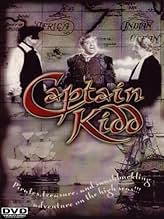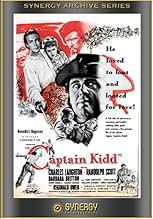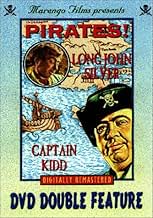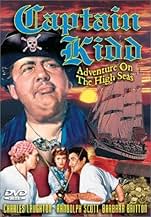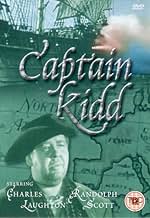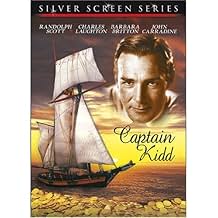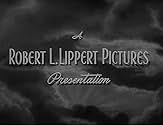IMDb-BEWERTUNG
6,3/10
2171
IHRE BEWERTUNG
Füge eine Handlung in deiner Sprache hinzuThe unhistorical adventures of pirate Captain Kidd revolve around treasure and treachery.The unhistorical adventures of pirate Captain Kidd revolve around treasure and treachery.The unhistorical adventures of pirate Captain Kidd revolve around treasure and treachery.
- Für 1 Oscar nominiert
- 1 Nominierung insgesamt
Abner Biberman
- Theodore Blades
- (Nicht genannt)
Harry Cording
- Newgate Prison Warder
- (Nicht genannt)
Jimmy Dime
- Pirate
- (Nicht genannt)
Lumsden Hare
- Lord Fallsworth
- (Nicht genannt)
Al Hill
- Peter Sharfstone
- (Nicht genannt)
George Huggins
- Pirate
- (Nicht genannt)
Handlung
WUSSTEST DU SCHON:
- WissenswertesCharles Laughton reprised his role as Captain Kidd in Piraten wider Willen (1952).
- PatzerSailors (who were unlikely to wear shoes on ships anyway) would never wear shoes into a powder magazine. The chances of a spark from boot/ shoe nails amid all that powder was too great.
- Zitate
Orange Povey: You cold-gutted shark.
Capt. William Kidd: Ahh!... You're a flatterer. You've no idea how gratifying it is to have a congenial soul to confide in.
- Alternative VersionenThe Roan Group DVD version, which comes from an excellent print, is sadly missing one of the best scenes in the film. In the scene Charles Laughton has trouble dressing for dinner on the ship, he is chastised for his hair-do by his valet, and then gets confused with his manners during dinner. We also learn a little more about Randolph Scott's character in this delightful scene. It can be found on the Australian VHS release from Force Video.
- VerbindungenFeatured in Sprockets: Masters of Menace (1995)
- SoundtracksRule Britannia
(uncredited)
Lyrics by James Thomson
Music by Thomas Augustine Arne
Heard when toasting the merchant ship and when the ships meet on the sea
Ausgewählte Rezension
A classic example of a pirate melodrama, this production purports to be based on the life of the historic Captain Kidd (played with campy, eye-waggling mannerisms by Laughton). There are few pirate cliches that don't find their way into Norman Reilly Raine's overwrought script - buried treasures, kidnapped maidens, English nobles masquerading as buccaneers. Much of it is unintentionally silly: It is, for example, impossible to take the hale, beefy, Virginia-twanged Randolph Scott as either an English nobleman or a pirate. Scott claims two friends aboard Kidd's pirate ship, both strangely effete, deferential characters: Another pirate, who acts as Scott's valet, and Kidd's own valet, who spends most of the movie surreptitiously assisting Scott in his scheming against the pirate captain. Kidd's companions, by comparison, are swaggering caricatures, and Kidd spends most of the movie scheming to dispatch them in one of the film's strangest images: Laughton, huddled over a small book, jotting down names or crossing them out, muttering to himself and cackling.
Much of this is good fun, and some of the cinematography is gorgeous - even by today's standards, the use of miniatures and trick camerawork creates a convincing illusion of ships at battle on roiling seas. But the story is so far from history that there seems to be no good reason to name Laughton after the real Captain Kidd, a bumbler whose short career as a pirate and humiliating death was little but a series of bizarre travesties. But the script is awkward and choppy, and many of the set pieces are strangely cramped and stagey, as though this were a theatrical production rather than a film. Ultimately, the true pleasure in watching the film comes from Laughton's peculiar performance, which is similarly theatrical, as though it were an oversized clown act from a London stage transferred to film. He plays Kidd without nuance, telegraphng the captain's bloated greed and amorality as though these were comical personal eccentricities. The closest the screen has since produced to Laughton's outre characterization is Harvey Fierstein's Pirate King character in 1997's Kull the Conqueror, which is pure camp.
Laughton was, in fact, gay, and though this fact is never made overt in Captain Kidd, there is some surprising subtext. Two scenes in particular strike contemporary eyes as having implicitly camp sensibilities - one in which Laughton sniffingly dismisses any interest in female companionship, and another scene in which Scott, a legitimate beefcake, shares a bath with his valet, both happily scrubbing each other while surrounded by hundreds of semi-clad pirates. Yo ho ho.
Much of this is good fun, and some of the cinematography is gorgeous - even by today's standards, the use of miniatures and trick camerawork creates a convincing illusion of ships at battle on roiling seas. But the story is so far from history that there seems to be no good reason to name Laughton after the real Captain Kidd, a bumbler whose short career as a pirate and humiliating death was little but a series of bizarre travesties. But the script is awkward and choppy, and many of the set pieces are strangely cramped and stagey, as though this were a theatrical production rather than a film. Ultimately, the true pleasure in watching the film comes from Laughton's peculiar performance, which is similarly theatrical, as though it were an oversized clown act from a London stage transferred to film. He plays Kidd without nuance, telegraphng the captain's bloated greed and amorality as though these were comical personal eccentricities. The closest the screen has since produced to Laughton's outre characterization is Harvey Fierstein's Pirate King character in 1997's Kull the Conqueror, which is pure camp.
Laughton was, in fact, gay, and though this fact is never made overt in Captain Kidd, there is some surprising subtext. Two scenes in particular strike contemporary eyes as having implicitly camp sensibilities - one in which Laughton sniffingly dismisses any interest in female companionship, and another scene in which Scott, a legitimate beefcake, shares a bath with his valet, both happily scrubbing each other while surrounded by hundreds of semi-clad pirates. Yo ho ho.
- ukuleleking
- 15. Mai 2003
- Permalink
Top-Auswahl
Melde dich zum Bewerten an und greife auf die Watchlist für personalisierte Empfehlungen zu.
- How long is Captain Kidd?Powered by Alexa
Details
- Erscheinungsdatum
- Herkunftsland
- Sprache
- Auch bekannt als
- Captain Kidd
- Drehorte
- General Service Studios - 1040 N. Las Palmas, Hollywood, Los Angeles, Kalifornien, USA(miniature 1695 London dock)
- Produktionsfirma
- Weitere beteiligte Unternehmen bei IMDbPro anzeigen
Box Office
- Budget
- 1.500.000 $ (geschätzt)
- Laufzeit1 Stunde 30 Minuten
- Farbe
- Seitenverhältnis
- 1.37 : 1
Zu dieser Seite beitragen
Bearbeitung vorschlagen oder fehlenden Inhalt hinzufügen

Oberste Lücke
By what name was Unter schwarzer Flagge (1945) officially released in India in English?
Antwort
